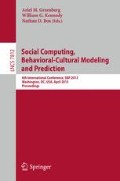Abstract
The present study provides the first evidence that personality can be reliably predicted from standard mobile phone logs. Using a set of novel psychology-informed indicators that can be computed from data available to all carriers, we were able to predict users’ personality with a mean accuracy across traits of 42% better than random, reaching up to 61% accuracy on a three-class problem. Given the fast growing number of mobile phone subscription and availability of phone logs to researchers, our new personality indicators open the door to exciting avenues for future research in social sciences. They potentially enable cost-effective, questionnaire-free investigation of personality-related questions at a scale never seen before.
Access this chapter
Tax calculation will be finalised at checkout
Purchases are for personal use only
Preview
Unable to display preview. Download preview PDF.
References
CNET, 2011 ends with almost 6 billion mobile phone subscriptions, http://news.cnet.com/8301-1023_3-57352095-93/2011-ends-with-almost-6-billion-mobile-phone-subscriptions/
de Montjoye, Y.-A., Hidalgo, C., Verleysen, M., Blondel, V.: Unique in the Crowd: The privacy bounds of human mobility. Nature Sci. Rep. (2013)
CNN, Your phone company is selling your personal data, http://money.cnn.com/2011/11/01/technology/verizon_att_sprint_tmobile_privacy/index.htm
de Oliveira, R., et al.: Towards a psychographic user model from mobile phone usage. In: Proceedings of the 2011 Annual Conference Extended Abstracts on Human Factors in Computing Systems. ACM (2011)
Arteaga, S.M., Kudeki, M., Woodworth, A.: Combating obesity trends in teenagers through persuasive mobile technology. ACM SIGACCESS Accessibility and Computing 94, 17–25 (2009)
Back, M.D., et al.: Facebook profiles reflect actual personality, not self-idealization. Psychological Science 21(3), 372–374 (2010)
Counts, S., Stecher, K.: Self-presentation of personality during online profile creation. In: Proc. AAAI Conf. on Weblogs and Social Media (ICWSM) (2009)
Stecher, K., Counts, S.: Spontaneous inference of personality traits and effects on memory for online profiles. In: Proc. Int. AAAI Conference on Weblogs and Social Media (ICWSM) (2008)
Chittaranjan, G., Blom, J., Gatica-Perez, D.: Mining large-scale smartphone data for personality studies. In: Personal and Ubiquitous Computing (2012)
Do, T.M.T., Gatica-Perez, D.: By their apps you shall understand them: mining large-scale patterns of mobile phone usage. In: Proceedings of the 9th International Conference on Mobile and Ubiquitous Multimedia. ACM (2010)
Verkasalo, H., et al.: Analysis of users and non-users of smartphone applications. Telematics and Informatics 27(3), 242–255 (2010)
Staiano, J., et al.: Friends dont Lie–Inferring Personality Traits from Social Network Structure (2012)
Pianesi, F., et al.: Multimodal recognition of personality traits in social interactions. In: Proceedings of the 10th International Conference on Multimodal Interfaces. ACM (2008)
Lynn, R., Martin, T.: Gender differences in extraversion, neuroticism, and psychoticism in 37 nations. J. Soc. Psychol. 137(3), 369–373 (1997)
Selfhout, M., et al.: Emerging late adolescent friendship networks and Big Five personality traits: A social network approach. J. Pers. 78(2), 509–538 (2010)
MacCann, C., Duckworth, A.L., Roberts, R.D.: Empirical identification of the major facets of conscientiousness. Learning and Individual Differences 19(4), 451–458 (2009)
MIT Human Dynamics Lab, Reality Commons, http://realitycommons.media.mit.edu/
Aharony, N., et al.: Social fMRI: Investigating and shaping social mechanisms in the real world. In: Pervasive and Mobile Computing (2011)
Onnela, J.P., et al.: Structure and tie strengths in mobile communication networks. Proc. Natl. Acad. Sci. U S A 104, 7332–7336 (2007)
Meloni, S., et al.: Modeling human mobility responses to the large-scale spreading of infectious diseases. Nature Scientific Reports 1 (2011)
Balcan, D., et al.: Multiscale mobility networks and the spatial spreading of infectious diseases. Proc. Natl. Acad. Sci. USA 106, 21484–21489 (2009)
Gonzalez, M., Hidalgo, C., Barabasi, A.: Understanding individual human mobility patterns. Nature 453, 779–782 (2008)
McCrae, R.R., John, O.P.: An introduction to the fivefactor model and its applications. Journal of personality 60(2), 175–215 (1992)
Williams, M.J., Whitaker, R.M., Allen, S.M.: Measuring Individual Regularity in Human Visiting Patterns. In: ASE International Conference on Social Computing (2012)
John, O.P., Srivastava, S.: The Big Five trait taxonomy: History, measurement, and theoretical perspectives. In: Handbook of personality: Theory and Research 2, pp. 102–138 (1999)
Benson, M.J., Campbell, J.P.: To be, or not to be, linear: An expanded representation of personality and its relationship to leadership performance. Int. J. Select. Asses. 15(2), 232–249 (2007)
Cucina, J.M., Vasilopoulos, N.L.: Nonlinear personality performance relationships and the spurious moderating effects of traitedness. J. Pers. 73(1), 227–260 (2004)
MacCallum, R.C., et al.: On the practice of dichotomization of quantitative variables. Psychol. methods 7(1), 19 (2002)
Guyon, I., Weston, J., Barnhill, S., Vapnik, V.: Gene selection for cancer classification using support vector machines. Mach. Learn. 46, 389–422 (2002)
Gomez, A., Gomez, R.: Personality traits of the behavioural approach and inhibition systems: Associations with processing of emotional stimuli. Pers. Indiv. Differ. 32(8), 1299–1316 (2002)
Vazire, S.: Who knows what about a person? The self-other knowledge asymmetry (SOKA) model. J. Pers. Soc. Psychol. 98(2), 281 (2010)
Author information
Authors and Affiliations
Editor information
Editors and Affiliations
Rights and permissions
Copyright information
© 2013 Springer-Verlag Berlin Heidelberg
About this paper
Cite this paper
de Montjoye, YA., Quoidbach, J., Robic, F., Pentland, A.(. (2013). Predicting Personality Using Novel Mobile Phone-Based Metrics. In: Greenberg, A.M., Kennedy, W.G., Bos, N.D. (eds) Social Computing, Behavioral-Cultural Modeling and Prediction. SBP 2013. Lecture Notes in Computer Science, vol 7812. Springer, Berlin, Heidelberg. https://doi.org/10.1007/978-3-642-37210-0_6
Download citation
DOI: https://doi.org/10.1007/978-3-642-37210-0_6
Publisher Name: Springer, Berlin, Heidelberg
Print ISBN: 978-3-642-37209-4
Online ISBN: 978-3-642-37210-0
eBook Packages: Computer ScienceComputer Science (R0)

